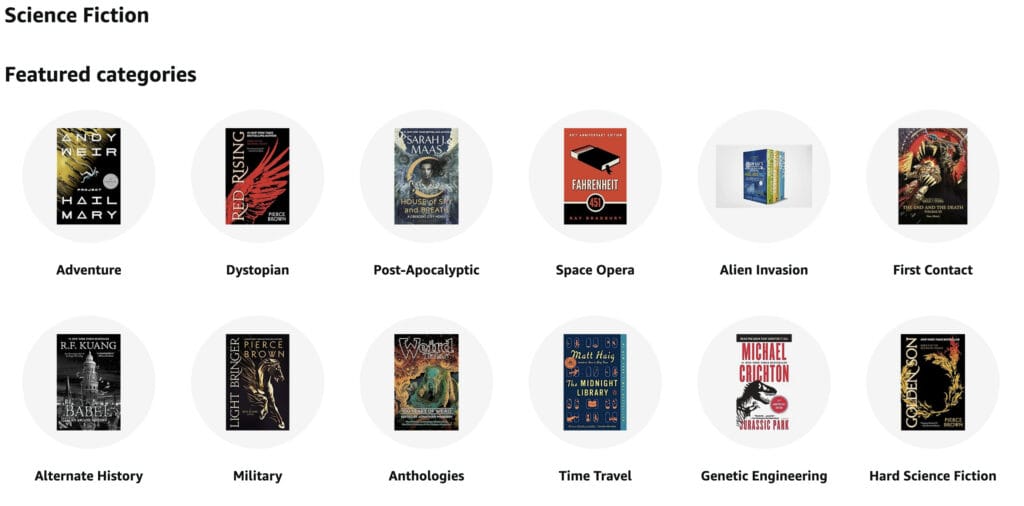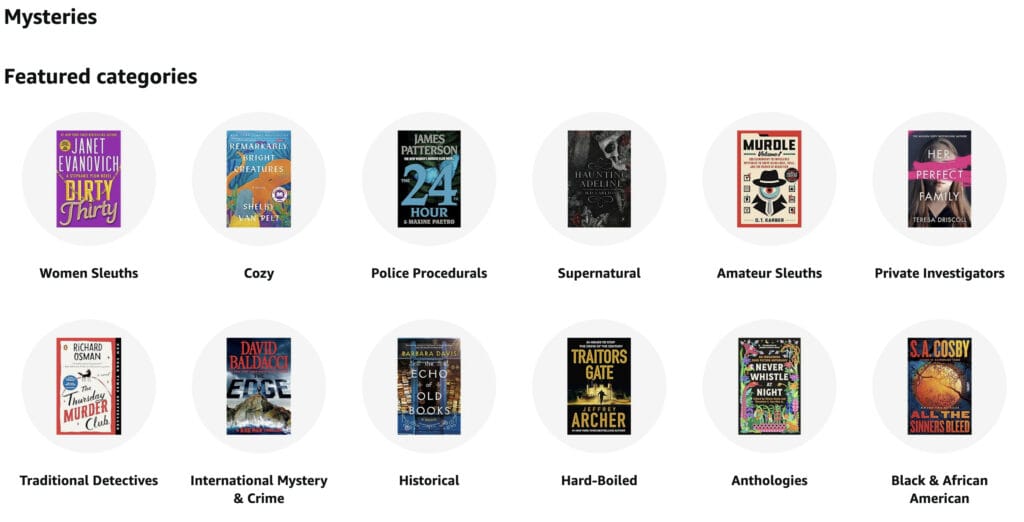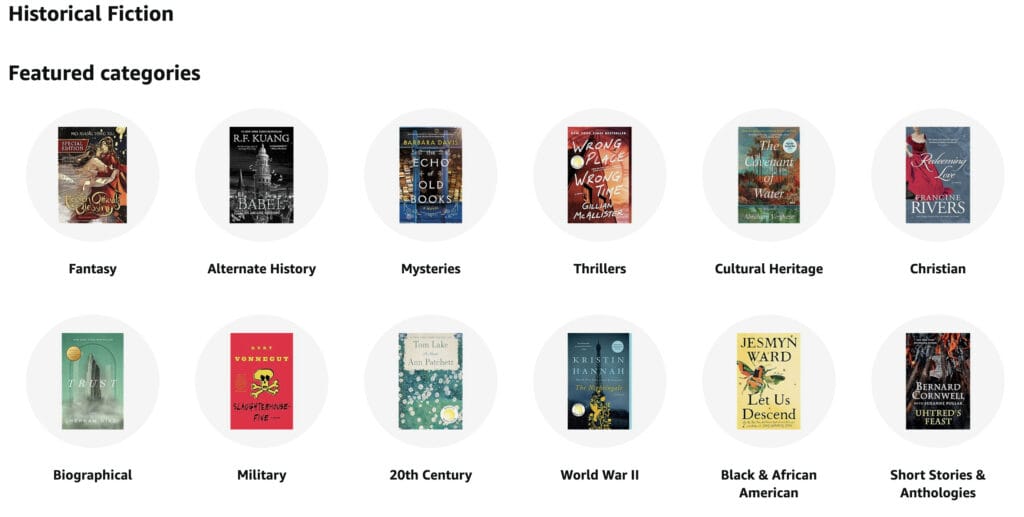I’m not generally a fan of writing rules. I believe books are art and art is creative and how can you put rules on art, anyway? But when it comes to genre expectations, it’s a rule I think writers need to know the effects of. Because once you know the effect, you’ll agree that it should be done.
When learning about writing a novel and what goes into it, you’ll probably read about making sure you’re fulfilling genre expectations—also commonly known as reader expectations.
I prefer to take the genre angle because readers are too diverse and will have expectations that have nothing to do with your book. Genre expectations is the more accurate term for what we’ll cover in this blog post.
Here’s what you’ll learn about genre expectations:
- The Anatomy of Good Book Reviews
- What are genre expectations?
- A List of Genre Expectations Per Genre
- How to Still Make Your Book Unique
- Mistakes to Avoid
The Anatomy of Good Book Reviews
The entire purpose of fulfilling genre expectations is to satisfy your target readers. Notice that I didn’t say “satisfy everyone”. I think we can agree that not everyone on this planet will like the same book. Some don’t even like to read. And even amongst readers, not all will enjoy the same characters, plots, or even genres.
To get good book reviews (which will in turn grow your author career by helping you sell more books and reach more readers), is about ensuring that readers who are attracted to the promise of your story (based on your book cover and description), are satisfied they got their worth from your book.
It’s simple math, actually:
Reader’s Time Spent Reading X Expectations of Story = Perception of Book Quality
Perception of book quality will equate to a star rating.
Obviously, it’s a little more nuanced than that, and I know that not all readers who enjoyed the book will even leave a rating or review. The point is that you want readers who enjoy your type of book to enjoy yours. The type refers to the book genre.
If the reader buys your book because they know they enjoy this genre, and the description and cover are appealing to them, they will consider it a quality book if they feel they didn’t waste their money.
What often ends up happening, and the cause of many negative book reviews, is when readers are surprised in a bad way. They read the book expecting it to be a different kind of story than it is, and that’s why they’re unhappy.
Book reviews, especially on Amazon, aren’t often about how the book is written. More often, they’re about whether or not the book fit a reader’s specific taste based on what they expected from the advertisement. That advertisement is the genre, cover, and book description.
Think about the times you get a product and it doesn’t work as advertised. We proclaim, “FALSE ADVERTISEMENT!” and get angry. Readers are no different, and a book is less subjective than we think it is. That’s why understanding genre expectations and learning to work within them is really important if you want to have a career as an author.
What are genre expectations?
Genre expectations are what a person expects of the book based on its advertisement. These expectations has nothing to do with plot holes, twists, or whether or not a reader predicts what happens in your book.
It’s purely based on what a reader knows to be true of certain genres and whether or not you adhere to those norms. Now, there’s a lot more flexibility than you might think based on this description. I know I’m making it sound like your book has to fit into this specific shape in order to work well, and that’s not necessarily true.
The criteria to fulfill genre expectations has a ton of wiggle room, and you’ve been unconsciously studying and understanding these criteria your entire reading life.
Here’s an example of genre expectations:
Claire peruses Amazon for a book and sees one that’s been recommended by the algorithm in the “others also liked” section. The cover depicts a teenage girl dressed in a tunic and harem pants, with bright magic surrounding her, and a dragon flying in the background. Since Claire has read many epic fantasy books with dragons, it looks like it’s within her taste. The description seems to match that, with promise of magic and dragons and rural setting, the details are vague but it seems evident that the main character will have to battle some evil. Claire buys it!
She begins to read, and after only two chapters, the main character enters a cave to find a dragon, only to fall through a portal into another realm, this one set in a modern day city, with cell phones and the like. Claire decides to stop reading, and goes to leave a 2 star review, sharing that the book started off great, but was not at all what she was looking for. It wasn’t what she was expecting, in a bad way.
This is an example of something that happens frequently when authors try to do something different, without giving any warning. Had this book’s cover depict the main character with a city background in those same rural clothes and a dragon, it would have given Claire a better idea of what to expect.
A List of Genre Expectations Per Genre & How to Use Them Uniquely
I won’t be covering every single book genre or their subgenres in this post. I will include the most commons ones and subgenres if they’re popular, along with the basic expectations all readers have. These are parameters you can work within while still creative a unique and original story.
1. Romance
You know it’s a full and romance-first genre when the story’s plot is about the romance as a main element. Many other genres include romances as a sub plot, but only romance makes the relationship the main plot.
Overall Genre expectations: Romance genre expectations have to do with two people falling in love despite reasons that keep them apart (conflict of the story). In a romance novel, there is a meet-cute, a coming together, conflicts, a separation, and then the happily-ever-after. These are fully expected in a true romance.
- Historical Romance subgenre expectations: This will include everything above, but in a historical setting with time-appropriate norms, customs, and the like.
- Romantic Comedy subgenre expectations: This will include all normal romance genre expectations but will utilize humor in situations, character interactions, and dialogue.
There is really only one version of romance that will not have a happily-ever-after and that is in a tragic romance. Unless you have clearly defined that your story is tragedy, readers will be really unhappy if your characters don’t end up in love at the end (or for now).
Otherwise, readers will expect—and therefore be upset if you don’t do it—the right couple to end up together in the end.
2. Fantasy
Overall Genre expectations: Magic is a requirement of fantasy. You can to include magical abilities or sources of magic somewhere in the story in order to be considered fantasy. Now, your plot doesn’t need to heavily involve magic, which is a mistake many make. Like the book Elantris, where magic is promised and accessed at the very end of the story. It just has to be present and significant to the story.
- Urban Fantasy subgenre expectations: The above expectations, but in a more modern, urban setting with current technology. One example is Gone God World by Ramy Vance.
- Epic Fantasy subgenre expectations: The expectation is that not only will magic be here, but it’ll be a longer book that takes place in a unique setting, and the plot or scope of the world is very big in nature. And example is The Way of Kings by Brandon Sanderson.
- Portal Fantasy subgenre expectations: This subgenre of fantasy inclues the normal expectations, along with the fact that the main character go through a portal, doorway, or other barrier to enter into a different world. An example is The Lion, The Witch, and the Wardrobe.
3. Science Fiction
Overall Genre expectations: In this genre, readers will expect a futuristic, advanced technologically, or space-centered plot. The idea is to take a look at current societal advancements or regressions and explore them with more “advanced” means.
There are a ton of subgenres that go into science fiction, and most of their expectations only require including elements of the subgenre name. Take a look at these examples from Amazon to see how they organize sci-fi books.

As you can see, the “Time Travel” subgenre would require time traveling along with the other science fiction expectations. For something like the “military” subgenre, it would be plot-specific and require the plot to include a military focus. “Alien Invasion” is obvious, as is “First Contact”.
4. Thriller / Suspense
Overall Genre expectations: Both of these genres will contain many elements of excitement and higher states of energy by using higher stakes and more extreme situations. The difference between the two is that thrillers will be more focused on elements of excitement and adrenaline whereas suspense uses more elements to induce anxiety, fear, and uncertainty. A good way to think about it is this:
Thriller = Excitement
Suspense = Anxiety
There is plenty of thrill in none-thriller stories and the same with suspense. All stories have tension if they’re written well. But the thriller and suspense genre have the majority of the plot taking place with tension, whereas other genres only have it included in certain moments.
5. Mystery
Overall Genre expectations: Readers of this genre will expect a story that centers around an event or crime (often murder) that requires solving, and that will be the primary plot of the book. Readers will expect clues to be given throughout the book and for a reveal (mystery solved) to happen by the end.
This is another broad genre that includes many subgenres. They’re fairly straightforward as well. Supernatural mystery will include a crime or event of supernatural origins. The historical mysteries will take place in a historical setting. You get the idea.

6. Paranormal
Overall Genre expectations: Readers of this genre (as well as supernatural and its subgenres) will expect paranormal elements, creatures, and/or settings along with a plot that includes these elements.
Oftentimes, this is a genre used in combination with another one in order to fulfill broader plot expectations. You’ll often find both paranormal and supernatural genres in the thriller and suspense category, and you’ll find them separately in the romance category.
7. Historical
Overall Genre expectations: Historical fiction is as it sounds; stories that take place at a time in history with the norms, customs, and settings of that time.
You’ll also find that this is a genre you can use to mix with another in order to craft additional expectations to draw in readers. Amazon gives a good list of the subgenres for historical fiction.

8. Dystopian
Overall Genre expectations: In this genre, readers will expect for a world that’s set in the future of our own, after major worldwide changes, included but not limited to government changes, world leadership, apocalypses, and more. One of the most important aspects here is that whatever future you create, it has to have originated with the world we live in now.
What’s unique about these genre expectations is that you can be very broad. You can have a society like the one in Handmaid’s Tale that’s not too distant from our current reality, or one like Red Rising, which takes place in such a distant future that humanity has inhabited other planets and moons.
And yes, technically dystopian can often be put in the science fiction genre, but not always.
How to Still Make Your Book Unique
Just because you’re fulfilling expectations doesn’t mean you can’t still write an original book. There are many epic fantasy novels that are unique because of the many other elements of fiction.
You can change anything in your book other than the nonnegotiables of that genre.
For most genres, those things are simple. If a nonnegotiable is the setting, as is the case with science fiction, then change up something else, like the narrative style or point of view or something else. Let’s not forget there are many tools you can use to tell a story other than its genre.
Here are all the elements available to you as a writer, other than genre:
- setting
- characters and their arcs
- narrative
- literary devices
- archetypes
- point of view
- theme
- style and voice
- structure
- plot
If your genre has a plot nonnegotiable, like with romance, then utiltize creativity in the other areas by putting them in a really cool setting, including interesting characters, and even toying with how you structure the story (assuming they still get a happily-ever-after).
You can also mix two genres to create something with a unique flare. Take all the nonnegotiables for an urban fantasy and make it a mystery. This might look like people solving a magical crime in the streets of Chicago.
Take a suspense story about someone on the run for her life and have her fall in love with someone who helps her to mix the suspense and romance genres.
There are still a ton of ways to utilize originality while still fulfilling genre expectations with these methods.
Mistakes That Often Cause Missed Expectations
Not all authors get this right. Many of us are writing a book to write a story in our heads. At first, this is enough and it’s useful to get you writing. But there is a reason some books make it big and others go unread, no matter how great you think the book is.
We just don’t know how to write a book for others, especially the masses. So we make mistakes that cause us to subvert genre expectations without even realizing it. To us, it’s creative! It’s different! It’s unique!
Here are some common mistakes when it comes to genre expectations that you might unknowingly be making:
- Trying to write a “one of a kind” story so much so that you turn away readers: There’s a difference between innovating in story and writing a confusing and convoluted story. Surprised to the reader, no matter what genre you write in, have to be foreshadowed and at least hinted at in the book’s advertisement. If you try to write a standard epic fantasy, only to change the last third of the book into an urban fantasy, it will upset readers who wanted the normal epic fantasy adventure. Now, you can you this, so long as it’s done right and the reader comes to expect it.
- Changing the ending of your genre: Or the nonnegotiables. Basically, in an effort to be unique or create a twist, you end up changing something that’s necessary for readers to be satisfied when reading in your genre.
- Including elements of other genres halfheartedly: Having only a little magic in a story that’s supposed to be historical fiction can get confusing. It’s not always bad, but unless the element will be a major part of the story, you risk alienating audiences. Sometimes it works, other times it pulls readers out of the book. This was the case with Man in the High Castle. At first, this seemed like your typical alternate history story, but then later there were supernatural elements introduced that really turned many readers off. That said, it was still a successful series, so it can work sometimes.
Getting genre expectations right isn’t always easy. The great thing is that most of us have read in the genre we write in for long enough to know where we can get creative and where we have to be firm on genre boundaries.
If you want some more hands-on help doing this, watch this class for more on how to write a great novel:
